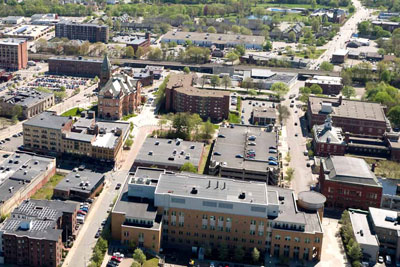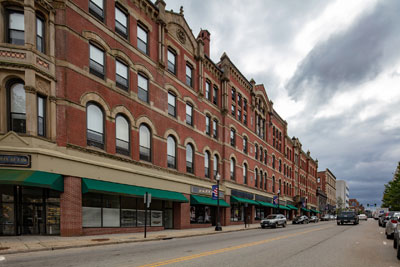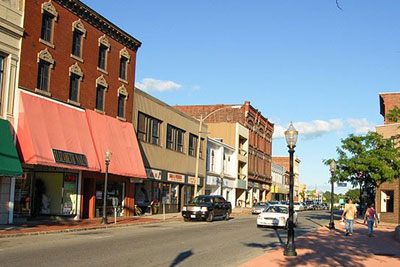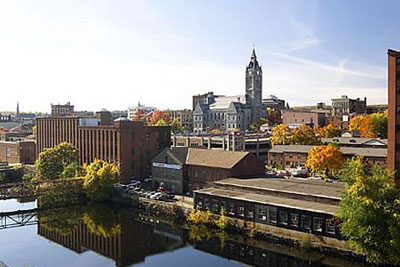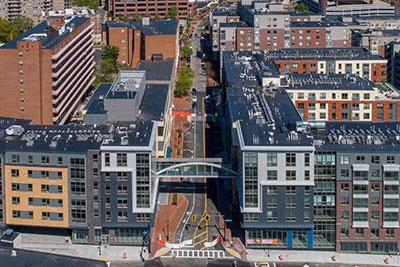
The Neighborhood Hub
The Neighborhood Hub is a technical assistance program that supports neighborhood revitalization in communities across the Commonwealth of Massachusetts.
The Neighborhood Hub helps municipalities and their local or regional partners identify and implement strategies to repair and renew neighborhoods with high rates of vacant, abandoned and deteriorating homes. The program prioritizes communities that were disproportionality affected by the Great Recession and the COVID-19 pandemic. Acknowledging that historic inequities have contributed to these disparities, the Neighborhood Hub will operate equitably to assist communities through this program's implementation.
The Neighborhood Hub is a multi-agency partnership that includes MassHousing, MassDevelopment, the Massachusetts Housing Partnership (MHP), the Massachusetts Association of Community Development Corporations (MACDC), the Massachusetts Institute for a New Commonwealth (MassINC), and the Commonwealth's Department of Housing and Community Development (DHCD), in collaboration with the Attorney General's Office.
Program Overview
In its first iteration, the Neighborhood Hub seeks to partner with five communities and their nonprofit partners for two years to provide technical assistance grants of up to $100,000.
Specifically, the Neighborhood Hub will:
- Work with these cities and their nonprofit partners to identify equitable, medium- and long-term strategies to address the challenges presented by abandoned properties;
- Support the implementation of the identified strategies over time by helping to build capacity at the local level.
Eligibility
At the current time, the program is open to the 26 Gateway Cities in the Commonwealth: Attleboro, Barnstable, Brockton, Chelsea, Chicopee, Everett, Fall River, Fitchburg, Haverhill, Holyoke, Lawrence, Leominster, Lowell, Lynn, Malden, Methuen, New Bedford, Peabody, Pittsfield, Quincy, Revere, Salem, Springfield, Taunton, Westfield, and Worcester.
Eligible Grant Activities
Activities will vary by community, but can include:
- Assistance developing or updating codes, ordinances or programs related to neighborhood stabilization, including rental licensing, building codes, inspection, and vacancy ordinances;
- Assistance crafting plans for neighborhood revitalization, including urban renewal plans, land disposition, receivership, and land banking programs;
- Support creating or improving programs that support neighborhood stability, including energy retrofits, lead removal, and cleanup programs.
During the two-year program, participating municipalities will also be expected to meet with the Hub manager and agency partners, attend program meetings and participate in related conferences. (Please note that during the COVID-19 pandemic, meetings will be held virtually.)
The Neighborhood Hub 2020 Cohort
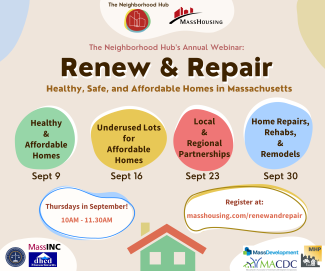
The 2021 Neighborhood Hub Annual Symposium
Renew and Repair: Healthy, safe, and affordable homes in Massachusetts
The 2021 Neighborhood Symposium brought together professionals from housing, public health, government and other fields for a series of in-depth conversations on topics of particular interest for Massachusetts' 26 Gateway Cities: Healthy & Affordable Homes; Underused Lots for Affordable Homes; Local & Regional Partnerships for Affordable Homes; and Home Repairs, Rehabs & Remodels.
Housing in the Gateway Cities Webinar
On September 15, 2020, the Neighborhood Hub hosted a webinar on housing stabilization in the Gateway Cities. The webinar included a presentation by Alan Mallach, Senior Fellow at the Center for Community Progress, statements from State legislators and officials, and a conversation with local practitioners.
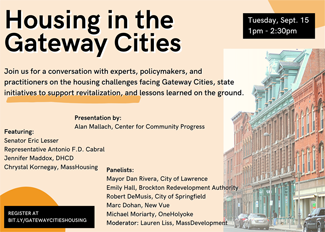

Data show Black and Latino residents increasingly purchasing in unstable Gateway City neighborhoods
In 2007, according to MassINC, 27 percent of the state's Black homebuyers purchased in Boston. But by 2017 that percentage had fallen to 11 percent, a 16-point drop. Over that same time period, the share of Black households purchasing homes in Gateway Cities jumped by 15 points, from 38 to 53 percent.
